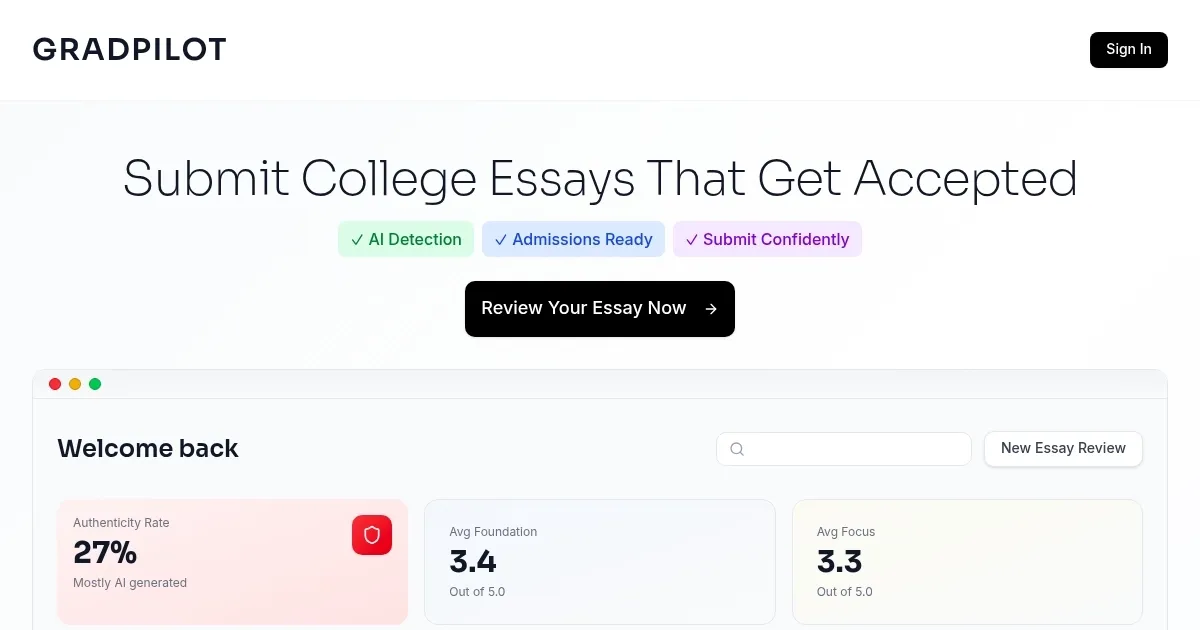GradPilot
Writing a college admissions essay is like trying to distill your entire soul into a 650-word snapshot, and GradPilot steps in to make sure that snapshot doesn’t scream “AI wrote me!” This tool, born from the mind of Nirmal Thacker, a Georgia Tech grad and AI engineer, tackles a modern admissions challenge: how to craft an essay that’s undeniably yours while dodging the AI detectors that 40% of colleges now use. I think it’s a clever answer to a problem most students don’t even realize they’re facing, blending tech smarts with practical guidance. GradPilot’s core mission is to help you polish your Common App essays, supplemental essays, or graduate school statements of purpose without losing your voice, and it does so with a sharp focus on authenticity.
The platform’s standout feature is its enterprise-grade AI detection, boasting a 99.8% accuracy rate and a mere 1 in 10,000 false positives. You upload your essay, and GradPilot runs it through a system powered by Pangram Labs to gauge how much of it sounds like it came from a chatbot like GPT-5. It assigns an “Authenticity Rate” (say, 27% if it’s heavily AI-generated) alongside Foundation and Focus scores, which evaluate structure, language, and prompt alignment. For example, an essay on “Why I want to study Environmental Science” might score 4.2/5 for Foundation and 4.5/5 for Focus, signaling a strong, human-crafted piece. The feedback is granular, pointing out weak transitions or off-topic tangents, and it’s tailored to rubrics for specific programs like Common App or PhD applications. What’s more, GradPilot tracks AI policies for 166 universities, so you know if your dream school, like Stanford, bans AI outright or allows line-level edits.
I like how GradPilot doesn’t just flag AI use but guides you toward better writing. It’s like having a coach who says, “Hey, this paragraph sounds robotic — here’s how to make it yours.” The suggestions are actionable, not vague, urging you to dig deeper into personal motivations. Compared to competitors like GradGPT or Agent.ai‘s Prompt, which focus more on essay optimization or general writing assistance, GradPilot’s niche is its laser focus on AI detection and university-specific compliance. It’s not trying to be a catch-all writing tool, and that’s refreshing.
That said, the tool isn’t flawless. The interface, while clean, can feel a bit clunky, especially when navigating between essay uploads and policy searches. Some users on Reddit noted that the feedback, while detailed, sometimes overwhelms with too many suggestions, leaving less-confident writers unsure where to start. Pricing is another sticking point — pay-per-essay at $2-$5 feels fair for occasional use but could add up for students revising multiple drafts. Unlike some other services that offer subscription-based coaching, GradPilot’s model might not suit those needing ongoing support. And while the university policy tracker is a gem, it’s limited to 166 schools, so if your target isn’t listed, you’re left guessing.
A surprise element? The founder’s story adds a human touch. Nirmal Thacker’s journey from struggling with his own essays to building GradPilot resonates with students, and his Reddit presence makes him oddly accessible for a tech founder. I wasn’t expecting to feel like the tool’s creator was rooting for me, but that vibe shines through. My advice: start with one essay, use the feedback to refine your voice, and check your school’s AI policy before submitting. If you’re juggling multiple drafts, budget carefully to avoid racking up costs.
What are the key features? ⭐
- AI Detection: Identifies AI-generated text with 99.8% accuracy to ensure authenticity.
- Foundation Score: Evaluates essay structure, language, and flow for clarity and coherence.
- Focus Score: Assesses alignment with specific prompts, like Common App or PhD applications.
- University Policy Tracker: Tracks AI policies for 166 universities to guide compliant essay writing.
- Prompt-Specific Rubrics: Provides tailored feedback for programs like MBA or law school essays.
Who is it for? 🤔
Examples of what you can use it for 💭
- High School Senior: Uses GradPilot to check Common App essay for AI use and refine personal voice.
- Graduate Applicant: Reviews PhD statement of purpose to align with Stanford’s AI policy.
- International Student: Ensures UC application essay passes AI detection for authenticity.
- MBA Candidate: Tailors essay with rubrics to meet Harvard’s admissions expectations.
- Counselor: Guides students using policy tracker to comply with university AI rules.
Pros & Cons ⚖️
- Accurate AI detection (99.8%).
- Tracks 166 university AI policies.
- Pay-per-essay pricing model.
- Interface can be slow, clunky.
- Pay-per-essay adds up fast.
FAQs 💬
Related tools ↙️
-
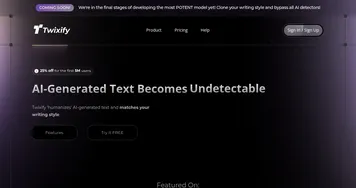 Twixify
An AI-driven tool that transforms AI-generated text into content that mirrors human writing styles
Twixify
An AI-driven tool that transforms AI-generated text into content that mirrors human writing styles
-
 Copyleaks
A tool for detecting plagarized or AI-generated content
Copyleaks
A tool for detecting plagarized or AI-generated content
-
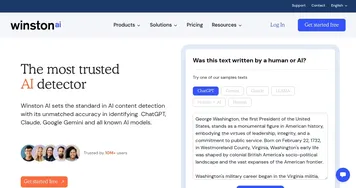 Winston
Powerful AI content detection solution for education and publishing
Winston
Powerful AI content detection solution for education and publishing
-
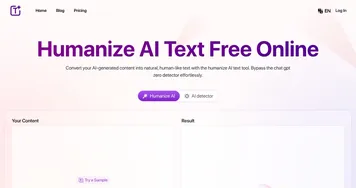 Humanize.im
A free online tool that can transform AI-generated content into natural, human-like text
Humanize.im
A free online tool that can transform AI-generated content into natural, human-like text
-
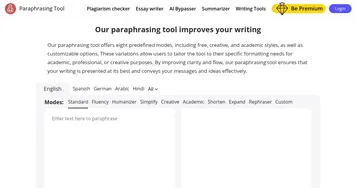 ParaphrasingTool.ai
Rewrites text to enhance clarity, tone, and originality using AI
ParaphrasingTool.ai
Rewrites text to enhance clarity, tone, and originality using AI
-
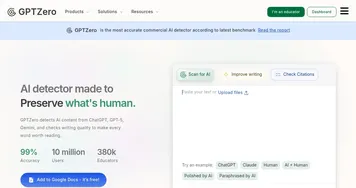 GPTZero
An AI detection tool used by over a million users worldwide to identify content created by AI models
GPTZero
An AI detection tool used by over a million users worldwide to identify content created by AI models


